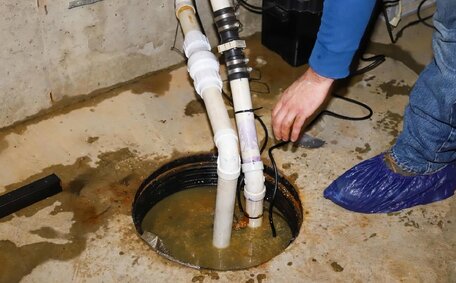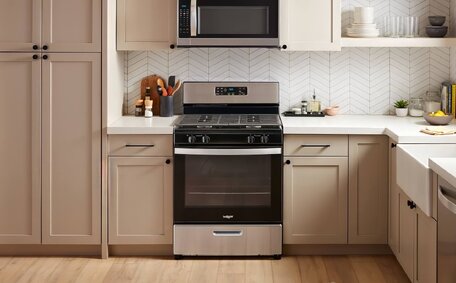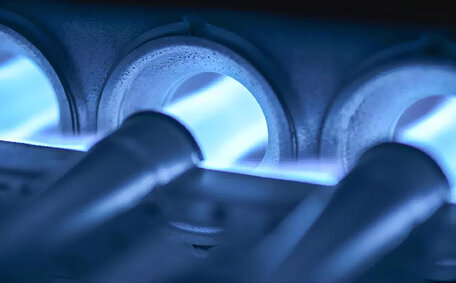Understanding Blocked Drains
Blocked drains are a major disruptor to daily household and business activities. According to industry data, Over 30% of plumbing emergencies are due to drain blockages. Clogged drains impair water drainage, resulting in backed-up pipes, foul odours, and potential property flooding.
Drains can get blocked due to accumulation of hair, grease, tree roots, and improper disposal of solid waste. Gradual buildup of debris causes pipes to constrict over time. Eventually, the flow of water slows to a trickle or stops completely.
Overlooking signs of partial clogs, such as slow-draining sinks and gurgling noises, can worsen the problem. It’s important to take quick action as soon as these symptoms appear to prevent severe pipe damage.
In dire circumstances, it’s critical not to wait—emergency situations call for a plumber right away. Plumbers may use high-pressure water jets or a cable snake to physically remove obstructions. Hence, immediate clearance of blockages is crucial.
Flooding with gas hot water or sewage backup could indicate a pipe rupture caused by the blockage.
Causes of Blockages
Common causes of blocked drains include:
- Food scraps - Leftover fats, oils, and solids from cooking often get rinsed down sinks, creating a coating within pipe structures over time.
- Hair - Loose hair catching in pipes is a leading cause of bathroom drain clogs.
- Tree roots - Invasive root systems penetrating exterior drainage pipes is a common issue.
- Foreign objects - Flushing inappropriate items like wipes, cotton buds, or feminine hygiene products can snag in pipes.
- Buildup - Sedimentary mineral deposits and soap scum accumulations narrow pipe diameters.
Blockages tend to amass just below the drain opening, causing a slow flow, or further down the pipe including elbow joints and junctions where debris congregates. Gradual buildup causes water to drain slower until it eventually stops completely.
Signs of a Blockage
There are several clear signs indicating a drain blockage has occurred:
- Slow draining - Sinks, tubs, and showers do not empty at the usual pace, taking much longer to drain.
- Gurgling sounds - Loud gurgles from the drain often signal trapped air and water struggling to pass through.
- Foul odours - Bad smells emanating from drains suggest sink traps have dried due to blocked water flow.
- Overflowing water - Water pooling around a drain, or bubbled up from another fixture’s drain signifies a full blockage.
If these symptoms arise, immediately reduce sink and bathwater drainage use. Adding more water to a problematic drain typically exacerbates blockages. Frequently halting drainage use also prevents overflows.
Supermarket chemical cleaners may clear minor blockages, but professional assistance is recommended for severe cases. Chemicals often mask odours without addressing the underlying problem.
Preventing Blockages
What do you need to know about preventing drain blockages? Here are several effective methods:
- Use drain screens on sinks and tubs to intercept hair and debris, protecting your plumbing.
- Pour boiling water mixed with baking soda and vinegar down sinks weekly to dissolve grease and keep drains clear.
- Avoid pouring fats, oils, or grease down drains; instead, dispose of them in containers once solidified.
- Only flush toilet paper, not wipes, feminine products, cotton buds, or similar solids that could snag in pipes.
- Trim overhanging trees around the exterior of your property to prevent invasive root blockages.
- Regularly clean bathroom and kitchen sink traps to eliminate accumulated hair and gunk.
- Monthly enzyme cleaner use can break down organic material, maintaining clear pipes.
Taking preventative measures greatly reduces the likelihood of severe obstructions in your plumbing system. Regular professional drain cleaning can remove any accumulated debris, keeping your plumbing clear.
Routine Maintenance
Conducting routine maintenance checks and engaging professional plumbers annually helps avoid problematic drain blockages and other plumbing disasters.
Homeowners should inspect sinks, showers and tubs monthly to check for slow drainage issues. Drain screens and traps should be cleaned out to remove accumulated hair and gunk. Kitchen sinks prone to grease buildup may need degreasing more frequently, such as weekly.
Have a licenced plumber perform thorough maintenance yearly to video inspect pipes, hydro jet drains, and clear stubborn drainline obstructions. Roots compromising your exterior sewer line may require specialist root cutting equipment. Any pipe cracks, leaks or joint seperations spotted during inspections can then be repaired.
Preventative maintenance eliminates debris before problems arise. It also assesses overall system integrity to avoid deterioration, preempting expensive emergency callouts. Adhering to a rountine maintenance schedule gives residents peace of mind their plumbing remains in reliable working order.
Items to Keep Out of Your Drains
There are many common household substances that should never enter drainage systems as they can cause severe blockages:
- Fats, oils and grease - Food residues coagulate inside pipes, clinging to walls and constricting the flow of water.
- Produce scraps - Leftover bits of fruits and vegetables quickly turn to sludge inside drains.
- Kitchen scraps - Food particles like rice, pasta and coffee grinds swell when wet and clog pipes.
- Hair - Loose strands wrap around each other forming dense meshes blocking water.
- Cotton buds - The cotton easily detatches and entwines into flow-stopping clumps.
- Paper towels - Fibrous paper towels can snag and accumulate inside pipes.
- Dental floss - Floss gets tangled into knots quickly blocking drainage lines.
- Condoms - Latex and rubber materials do not break down and obstruct flow.
- Napkins and tampons - Absorbant fibres rapidly swell and stick firmly to pipe walls.
- Kitty litter - Clay clumps eventually harden to cement blocking pipes.
While individually small and seemingly harmless, Repeated instances of pouring such substances down drains can lead to gradual buildup. Over time, enough debris accumulates at drainage bottlenecks to severely slow then prevent all water outflow. Avoid putting too much of anything besides water, bodily waste and toilet paper down drains.
Responding to a Blockage
When faced with a blocked drain, prompt action is crucial to avoid extensive water damage and other problems. For an immediate response:
- Stop running any water into affected drains until the blockage is cleared.
- Use a plunger over drain openings to try dislodge and push through debris.
- Pour a boiling water and baking soda mixture down sinks, then follow with vinegar to induce foaming and help dissolve grease.
- Use a wire coat hanger to loosen hair or debris clumped near drain openings.
If water overflows or persistent foul sewage smells occur, contacting an emergency plumber becomes necessary. Seek prompt professional help as significant pipe ruptures may be present. Professionals have specialised drain snaking equipment and high-powered jet sprayers to thoroughly clear stubborn obstructions.
In dire cases with sewage flooding, evacuate the premises immediately and contact emergency services. Raw sewage carries infectious diseases, making rapid containment and sterilisation crucial. Professional cleaning services should then be engaged to sanitise all contaminated areas once drain issues are fixed.
Trying Home Remedies
When comes to minor drain blockages, home remedies can sometimes clear obstructions and restore flow before calling a professional. Exercise caution, as improper methods can exacerbate the issue.
Using a plunger over sink, tub or shower drains creates suction that may dislodge debris. Cover overflow holes first. Place the plunger firmly over the drain opening and plunge up and down rhythmically 10-15 times to apply forceful pressure.
Pouring a boiling hot mixture of water, baking soda and vinegar down afflicted drains can help dissolve certain blockages. The heat and chemical reaction breaks up grease while the ingredients scrub pipe walls. Allow the mixture to sit for 5-10 minutes before flushing it through with hot water.
Avoid these home treatments if water overflows from fixtures, as it risks further flooding damage. Always enlisting a licenced plumber for recurrent or severe blockages is safer than DIY attempts.
Calling a Professional
For severe drain blockages or backed-up sewage, promptly contact a professional plumbing service like Paddington Plumbing. Attempting makeshift fixes with store-bought drain cleaners or improvised devices risks exacerbating the situation and causing structural damage.
Our technicians use industrial-grade tools to effectively clear stubborn obstructions. We can deploy high-powered jet sprayers through drainage lines to thoroughly dislodge blockages. Where necessary, we also leverage pipe inspection cameras to accurately locate buildup hotspots.
In sewage flooding emergencies, rapid action is essential to contain the contamination. Our team is trained to adhere to sanitation protocols for safely managing spills. We can then coordinate extensive restoration efforts including drainage repairs, flood extraction, and decontamination.
Relying on amateur fixes often necessitates costly rework by plumbers later. Prompt engagement of our emergency response teams can prevent pipe corrosion, property damage, and health risks.
Health Risks of Blocked Drains
Blocked drains can lead to health hazards such as bacterially-infested stagnant water if sewage backs up and remains unchecked. Pipe ruptures also risk raw sewage flooding that carries gastroenteritis, hepatitis and other diseases.
As water flow slows in your plumbing, dangerous plumbing gas build-up is also a concern, allowing pathogenic microorganisms to rapidly multiply. Harmful water gas elements like hydrogen sulphide, carbon monoxide and methane build up inside pipes then get released into households. These toxic fumes cause headaches, nausea and dizziness if inhaled prolongedly.
Eventually, excess water pressure can rupture drain lines, flooding premises with backed-up sewage. Raw sewage harbours various dangerous bacteria including Escherichia coli, Salmonella, and Staphylococcus aureus. Contact with raw sewage has the potential to cause gastrointestinal, dermatological and respiratory infections, particularly in vulnerable individuals like children and the elderly.
If sinks, tubs or toilets overflow with foul water, evacuate immediately and call emergency services. Our technicians at Paddington Plumbing are fully trained and equipped to safely handle sewage contamination. Call us on 1300 349 338 to schedule an urgent appointment or emergency home visit.






